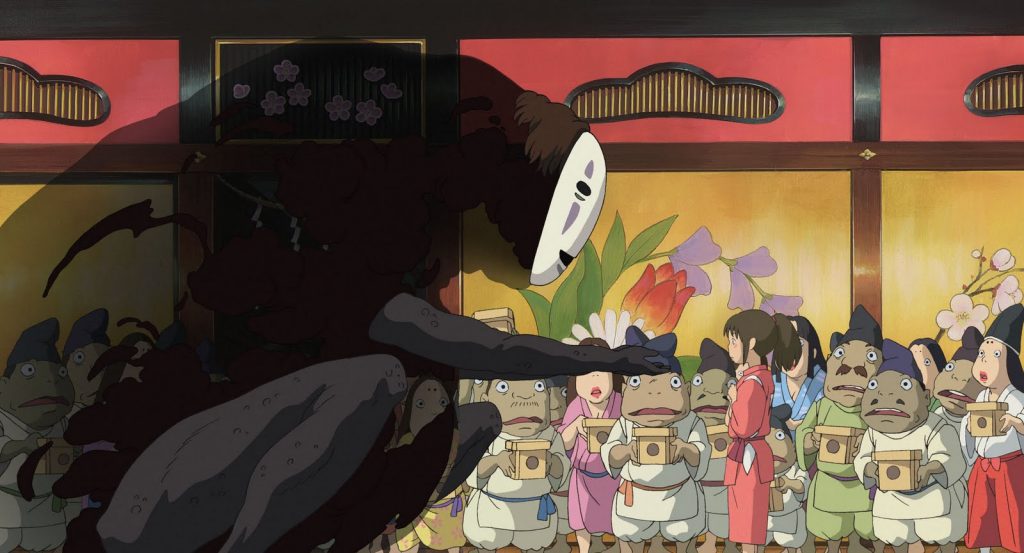Spirited Away (2001)

Just a quick note, for those who are curious: I viewed this in the original Japanese language with English subtitles, and not the dubbed version which was released theatrically in the US with voices by American actors.
My only previous exposure to the much lauded work of Hayao Miyazaki is the acclaimed Princess Mononoke back in 1997. That film is a work of art in many ways, with a terrific sense of character development and storytelling that is almost unrivaled in animated features produced here in the United States. I have eagerly anticipated watching Miyazaki’s latest film, Spirited Away, knowing that it has set box office records in Japan and scooped up countless awards and prizes at various film festivals all over the world, with its supporters bandying about taglines like “masterpiece” and “best film of the new millennium.” With such lofty expectations in mind, it has been difficult resolving myself to the fact that I can’t jump on the bandwagon because, quite frankly, Spirited Away did not move me emotionally the way some others may have been affected while watching it. While I will acknowledge that this is no doubt a work of a great artist, as a story I did not find it as compelling as Princess Mononoke, and at over two hours running length, I found myself actually growing bored and anxious for a conclusion during many scenes of which I had minimal interest.
The film centers around a young girl named Chihiro who, one day while on a road trip with her loving parents, gets sidetracked into an abandoned amusement park. Intrigued, they decide to check the place out and find a smorgasbord of food awaiting them in a nearby restaurant. The parents eagerly partake, while Chihiro does not, and as the day draws to a conclusion, spirits begin to emerge in the darkness of night. Frightened, Chihiro seeks the protection of her parents only to find that they have turned into large pigs, and only with the help of a mysterious young boy named Haku does she have hope of surviving the evening and restore her parents back to their former selves. Part of the survival plan includes Chihiro getting a job in a hotel meant for powerful creatures of the spirit world, but the work proves a challenge and the inhabitants strange and dangerous.
There are several key themes that develop in Spirited Away which offer a moral lesson about the dangers of gluttony and greed, while also promoting the benefit of hard work and paying respect to one’s elders to achieve one’s goals. This gives Spirited Away a nobility that is rare among animated features regardless of country of origin, and with a bevy of creatures wild and grotesque, viewing it is truly a unique experience. Comparisons can be drawn to “Alice in Wonderland,” and I must admit that if Spirited Away is an allegorical story, and there appears to be every evidence that it is, the true deeper significances of each creature is mostly lost on me, and I suspect the same will be true for many others who might be reading this now.
Other deeper meanings include the sadness inflicted upon nature by wasteful humans that pollute and corrupt the environment, caring little for the inhabitants and for the ways of beliefs of those ancestors who came before. Only Chihiro, the innocent child too young to have been corrupted by the avarice of society, seems to lack the desire to do things strictly for her own pleasures, and seeks the betterment of her friends, family and those around her, figuratively and literally.
Credit Miyazaki for painting perhaps the most realistic visions of a young girl I’ve seen in a film, with almost every gesture, expression and word uttered feeling as if we are watching a real-life child. It almost seems rude to call this a cartoon, as the character of Chihiro is as far from “cartoonish” as can be. Most of the main interest in the events come, not because we are vitally interested in the background of the spirits or the city they inhabit, but because we come to care for Chihiro, and fear for her safety, all alone in a world full of danger at every turn. The animation is remarkable, not because it looks realistic, but because the characters’ movements and expressions are. Also, there is a terrific score by Jo Hisaishi, the longtime collaborator with Miyazaki, that perfectly accentuates the mood and action.
Yet, as much as I am in awe of Miyazaki’s prodigious talents and respect many of the film’s intentions, I still remained aloof to the proceedings. While there is depth to the characters and the themes are multi-faceted, the story itself didn’t grab me the way I thought it should given the richness of the elements that comprise it. Some scenes held almost no interest to me whatsoever, and most of the time spent watching them required a concerted effort on my part not to let my mind drift away to other things.
Spirited Away is one of those films that you are either into or you aren’t. It’s definitely going to hit home with people who admire a talented genius at work, and those who love unique characters and richness in adventure, especially if you agree with the moral lessons the film has to teach. As for me, the elements of the story reminded me a little too much of Jim Henson’s Labyrinth, another Alice in Wonderland-like film that I found to be much more engaging, even if it isn’t as profound as Miyazaki’s creation.
That Spirited Away is a remarkable achievement, I have no doubt. Perhaps it is just me that wasn’t “in the spirit of things” to be carried away myself.
Qwipster’s rating: A-
MPAA Rated: PG for some scary moments
Running Time: 125 min.
Cast (voices): Rumi Hiiragi, Miyu Irino, Mari Natsuki, Takashi Naito, Yasuko Sawaguchi
Director: Hayao Miyazaki
Screenplay: Hayao Miyazaki
